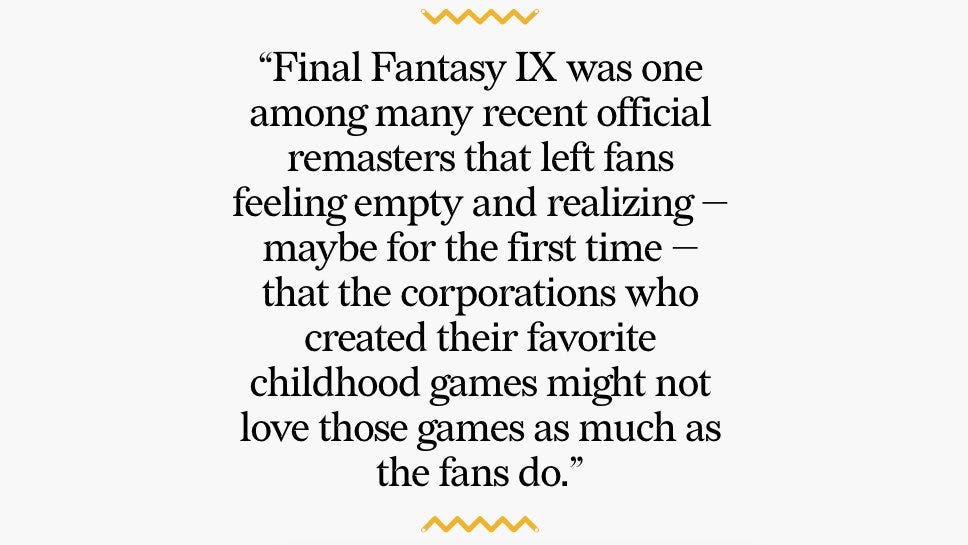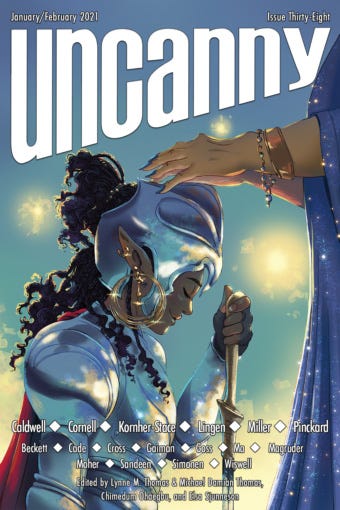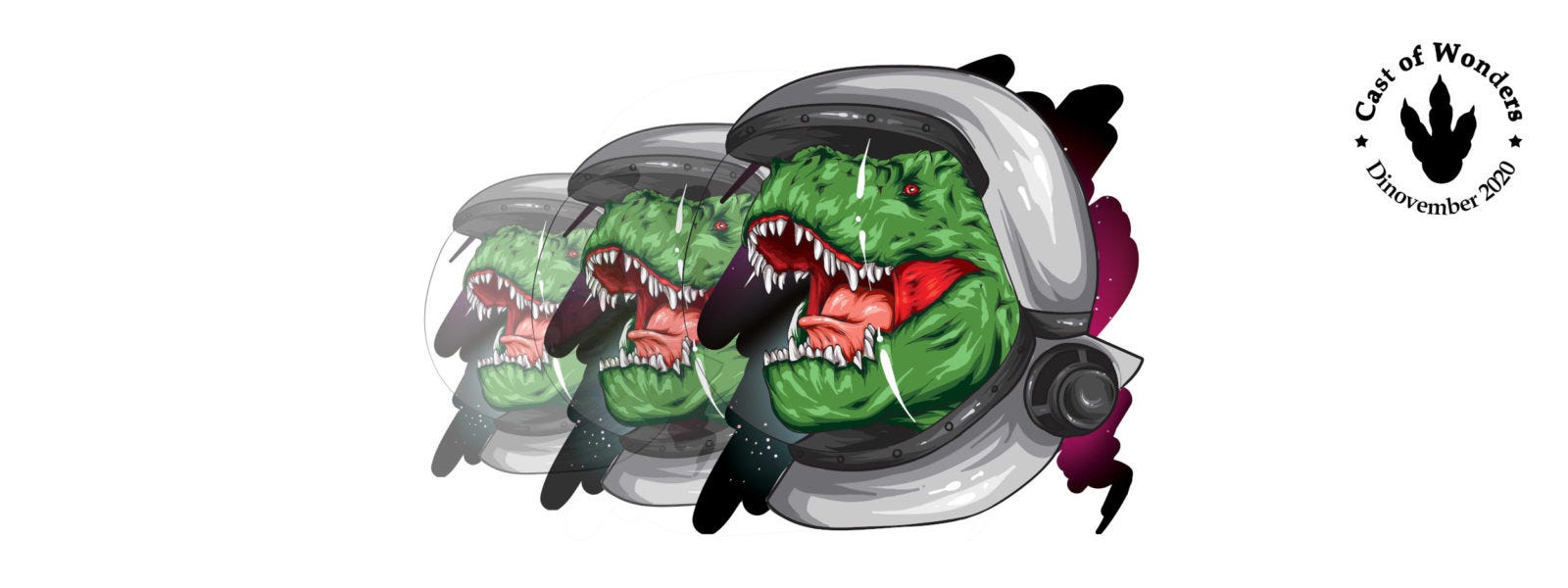Out & About: Artificial Intelligence is revolutionizing retro games, Hayao Miyazaki is spilling magic, and the Velocirapture is here
December was a busy month for a whole host of reasons. Birthdays, holidays, writing deadlines, and everything between. It was so busy for me, in fact, I can’t fit all of my new work in a single issue of Astrolabe, so I want to point you in the direction of three creative efforts from December I’m really proud of.
These cover a huge range of topics (as my work tends to), including a Final Fantasy IX fan mod, AI machine learning, My Neighbour Totoro, magic as a metaphor for wonder, and game preservation. There’s also a fun project for the Cast of Wonders podcast that was a first for me.
Onward!
AI is about to transform the future (and past) of video games

The Final Fantasy IX remaster should've been my jam. But it wasn't. Not until a team of fans released a free AI-powered HD revamp called Moguri Mod that puts Square Enix's efforts to shame. How does a small group of fans without a budget one up a billion dollar enterprise?
To find the answer, I spoke with Gaël Honorez who created the mod, Video Game History Foundation co-director and founder, Frank Cifaldi, and retro game fan Marc Lauzon-Bragg. The answer was both simpler and more complex than I expected.
I'm playing through Moguri Mod now, and what I've discovered isn't just a modern splash of paint on a classic game, but an experience that looks the way I remember the game looking when I first played it 20 years ago on my tube TV. Preservation means retaining knowledge in its original form, but projects like Moguri Mod make me wonder how we can approach the preservation of experiences — how a kid playing Final Fantasy IX can experience the same joy I did long after the last PlayStation has died, CRTs are nothing more than a memory, and technology has advanced toward Star Trek's utopia.
"Fans have the passion that drives them to dig and scrape for tiny incremental improvements wherever they can, to make a better experience," Cifaldi said. "Once it's commonly understood that fan restorations are the definitive versions of the games, I think the commercial industry may start catching up."
As games leave their adolescence, fans like Marc Lauzon-Bragg, developers like Gaël Honorez, and archivists like Frank Cifaldi are eager to find ways not just to keep the past alive, but to improve the way we experience it. Fan restorations like Moguri Mod prove that the success of remasters isn't predicated on a huge budget, but rather a solid vision of what made the original so beloved in the first place. Combine that with a fanbase that's becoming progressively more skilled and experienced in game creation and a proven love for the classics, and the future of retro gaming is looking better than ever.
Read “AI is about to transform the future (and past) of video games”
Hayao Miyazaki’s Lost Magic of Parenthood

Never give up on your ideas, folks. I started conceptualizing and writing this piece 18 months ago, and it finally found a loving home at one of my very favourite publications: the award-studded Uncanny Magazine.
As a parent, I’ve found great joy in watching my children grow up, become adventurous, and discover magic I’d forgotten existed in the everyday things and places around me. This piece is an examination of the themes of childhood, parenthood, and magic in three of Hayao Miyazaki’s most beloved films: My Neighbour Totoro, Ponyo, and Spirited Away.
The beating heart of these films are the children around whom the story warps, and the interactions they have with the magical and natural worlds around them. A small boy named Sosuke meets a magical goldfish; Chihiro explores a bathhouse home to myriad spirits; sisters Satsuki and Mei befriend a lovable troll called Totoro. Miyazaki is well loved for his evocative recreations of rural and urban Japan throughout the 20th century, but the magical additions are what make them classics.
Central to these films is the way their magical worlds are revealed to their young protagonists, leaving the parents—obsessed with the things that haunt all adults—unaware of the wonder under their very noses. Miyazaki loves to explore how we forget the magic in our world as we're crushed by the weight of societal expectations and capitalistic progress.
It's difficult to ascertain in Miyazaki’s films whether the magical elements occurring on screen are real—or a figment of the beautiful imaginations of children untainted by responsibility, unjaded by social pressures of adolescence, unburdened by the backbreaking demands of adulthood.
You can read this essay by purchasing the latest issue of Uncanny Magazine. It will also be released for free on their website on February 2nd, 2021. I highly recommend the whole issue, though. It’s packed with brilliant work by Marissa Lingen, Sam J. Miller, Neil Gaiman (!!! WHAT?), Miyuki Jane Pinckard, and many others.
Read “Hayao Miyazaki’s Lost Magic of Parenthood”
Hosting Cast of Wonders episode 440: “Velocirapture” by Jennifer Lee Rossman

So, this was a cool experience. Early in 2020, I was approached by Cast of Wonders Assistant Editor Andrew K. Hoe with an opportunity to host one of their upcoming episodes. Andrew specifically wanted me to host Jennifer Lee Rossman’s wonderful “Velocirapture,” so I could discuss sentient dinosaurs. We’re both fans of classic Super Nintendo JRPG Chrono Trigger, which feature some of the most sympathetic sentient dinos around, so this was a perfect fit.
I bought myself a good microphone, set up a… bespoke sound recording studio in my tiny walk-in closet, and, well, I’m pretty proud of the results. Rossman’s story deserves the very best, so I tried to deliver. I’ve never done audio like this before, so I’d love to hear how you thought I handled myself!

